Incentives and Earnings Management: A Case Study of One-Tel's Collapse
VerifiedAdded on 2020/02/24
|7
|1257
|159
Report
AI Summary
This report examines the earnings management practices employed by One-Tel, an Australian telecommunications company that collapsed in 2001. The report delves into the various incentives that drove managers to manipulate financial reports, including bonus entitlements tied to earnings targets, adherence to debt agreements, and avoidance of regulatory costs. It provides examples of how these incentives led to the falsification of financial statements, ultimately misleading stakeholders. The analysis highlights the techniques used to alter financial reports, emphasizing the impact on the company's corporate governance and internal controls. The report concludes that earnings management was a significant factor in One-Tel's failure, despite its initial position in the telecommunications industry, underscoring the importance of ethical financial reporting. The report references multiple academic sources to support its findings.
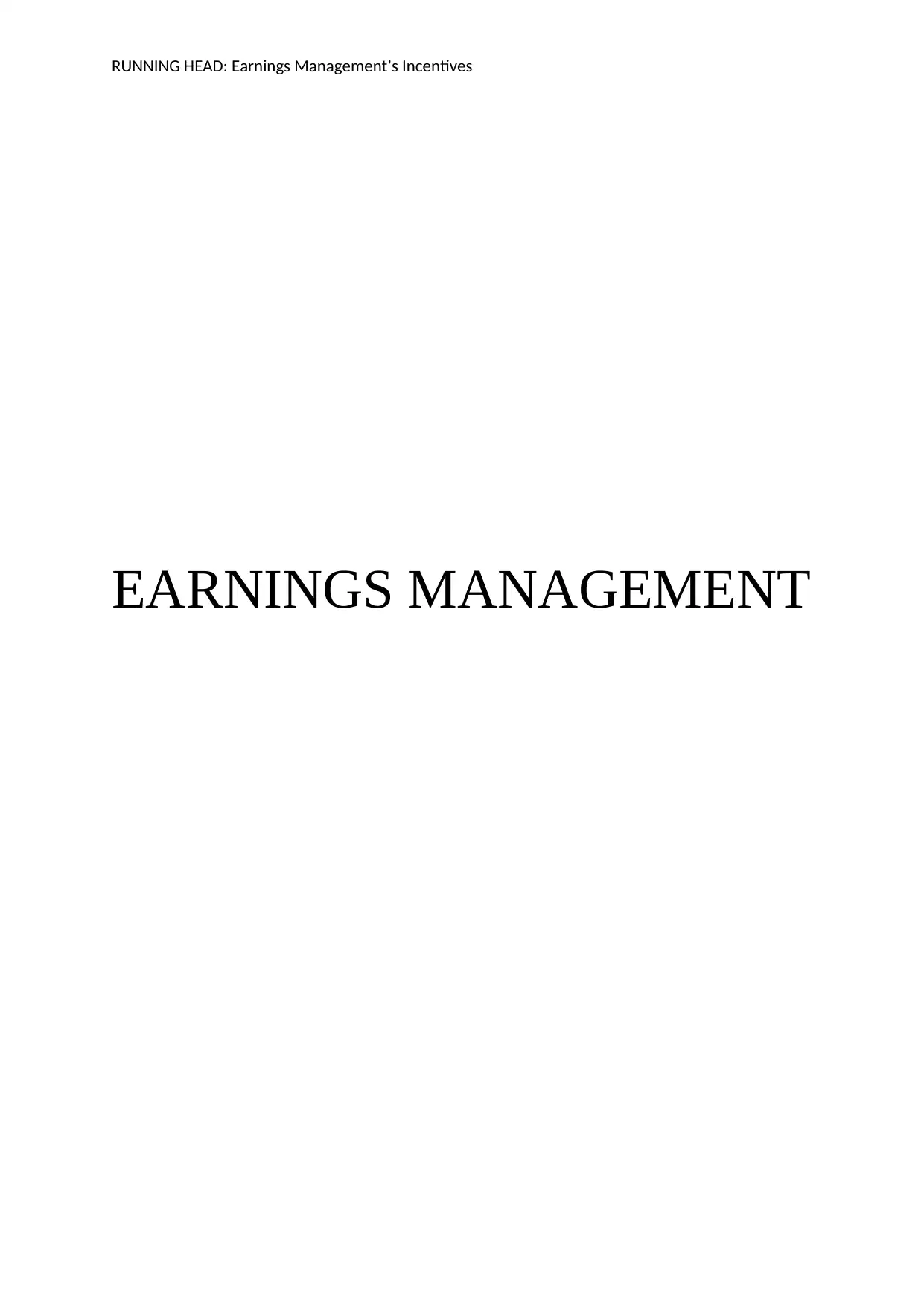
RUNNING HEAD: Earnings Management’s Incentives
EARNINGS MANAGEMENT
EARNINGS MANAGEMENT
Paraphrase This Document
Need a fresh take? Get an instant paraphrase of this document with our AI Paraphraser
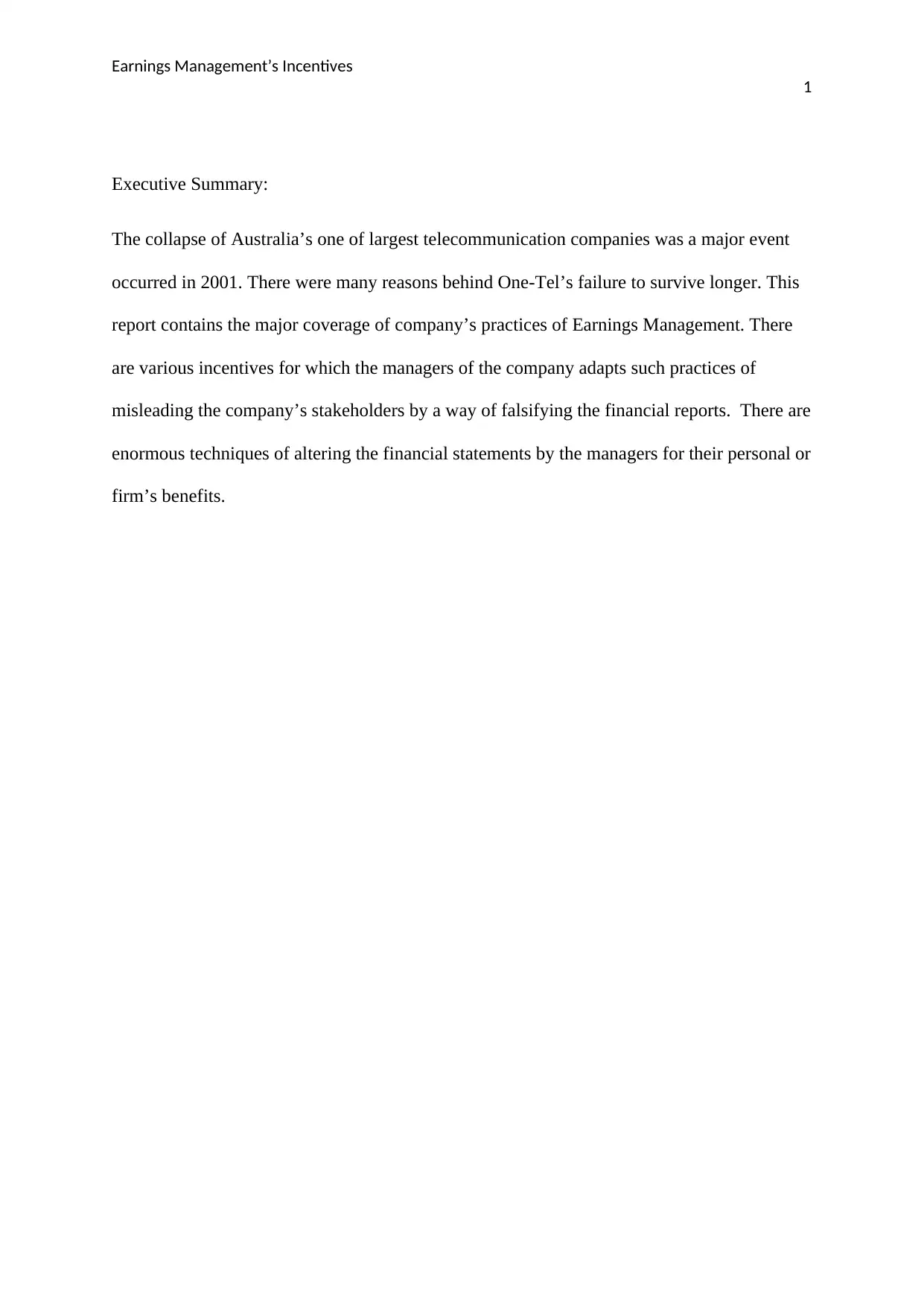
Earnings Management’s Incentives
1
Executive Summary:
The collapse of Australia’s one of largest telecommunication companies was a major event
occurred in 2001. There were many reasons behind One-Tel’s failure to survive longer. This
report contains the major coverage of company’s practices of Earnings Management. There
are various incentives for which the managers of the company adapts such practices of
misleading the company’s stakeholders by a way of falsifying the financial reports. There are
enormous techniques of altering the financial statements by the managers for their personal or
firm’s benefits.
1
Executive Summary:
The collapse of Australia’s one of largest telecommunication companies was a major event
occurred in 2001. There were many reasons behind One-Tel’s failure to survive longer. This
report contains the major coverage of company’s practices of Earnings Management. There
are various incentives for which the managers of the company adapts such practices of
misleading the company’s stakeholders by a way of falsifying the financial reports. There are
enormous techniques of altering the financial statements by the managers for their personal or
firm’s benefits.
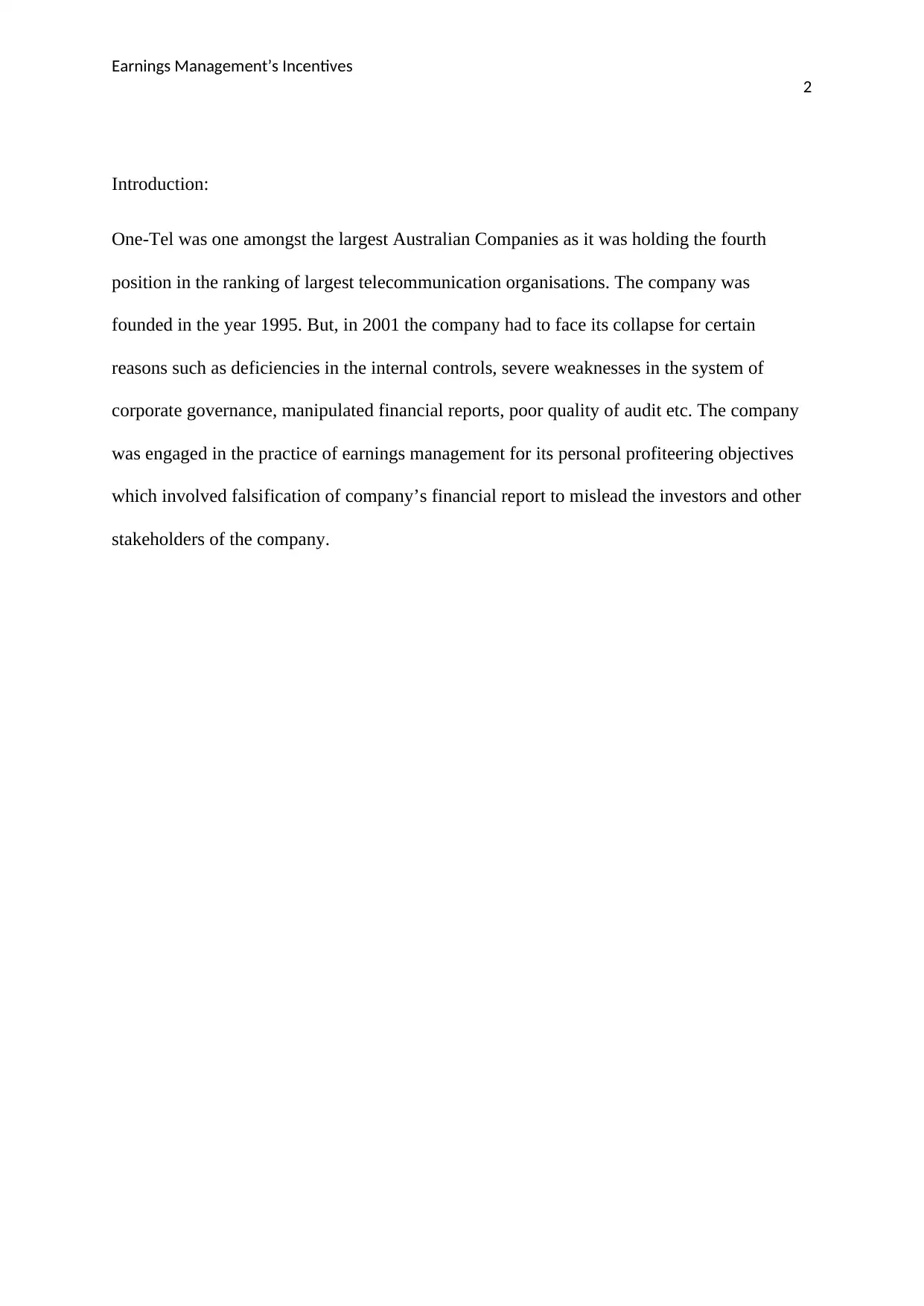
Earnings Management’s Incentives
2
Introduction:
One-Tel was one amongst the largest Australian Companies as it was holding the fourth
position in the ranking of largest telecommunication organisations. The company was
founded in the year 1995. But, in 2001 the company had to face its collapse for certain
reasons such as deficiencies in the internal controls, severe weaknesses in the system of
corporate governance, manipulated financial reports, poor quality of audit etc. The company
was engaged in the practice of earnings management for its personal profiteering objectives
which involved falsification of company’s financial report to mislead the investors and other
stakeholders of the company.
2
Introduction:
One-Tel was one amongst the largest Australian Companies as it was holding the fourth
position in the ranking of largest telecommunication organisations. The company was
founded in the year 1995. But, in 2001 the company had to face its collapse for certain
reasons such as deficiencies in the internal controls, severe weaknesses in the system of
corporate governance, manipulated financial reports, poor quality of audit etc. The company
was engaged in the practice of earnings management for its personal profiteering objectives
which involved falsification of company’s financial report to mislead the investors and other
stakeholders of the company.
⊘ This is a preview!⊘
Do you want full access?
Subscribe today to unlock all pages.

Trusted by 1+ million students worldwide
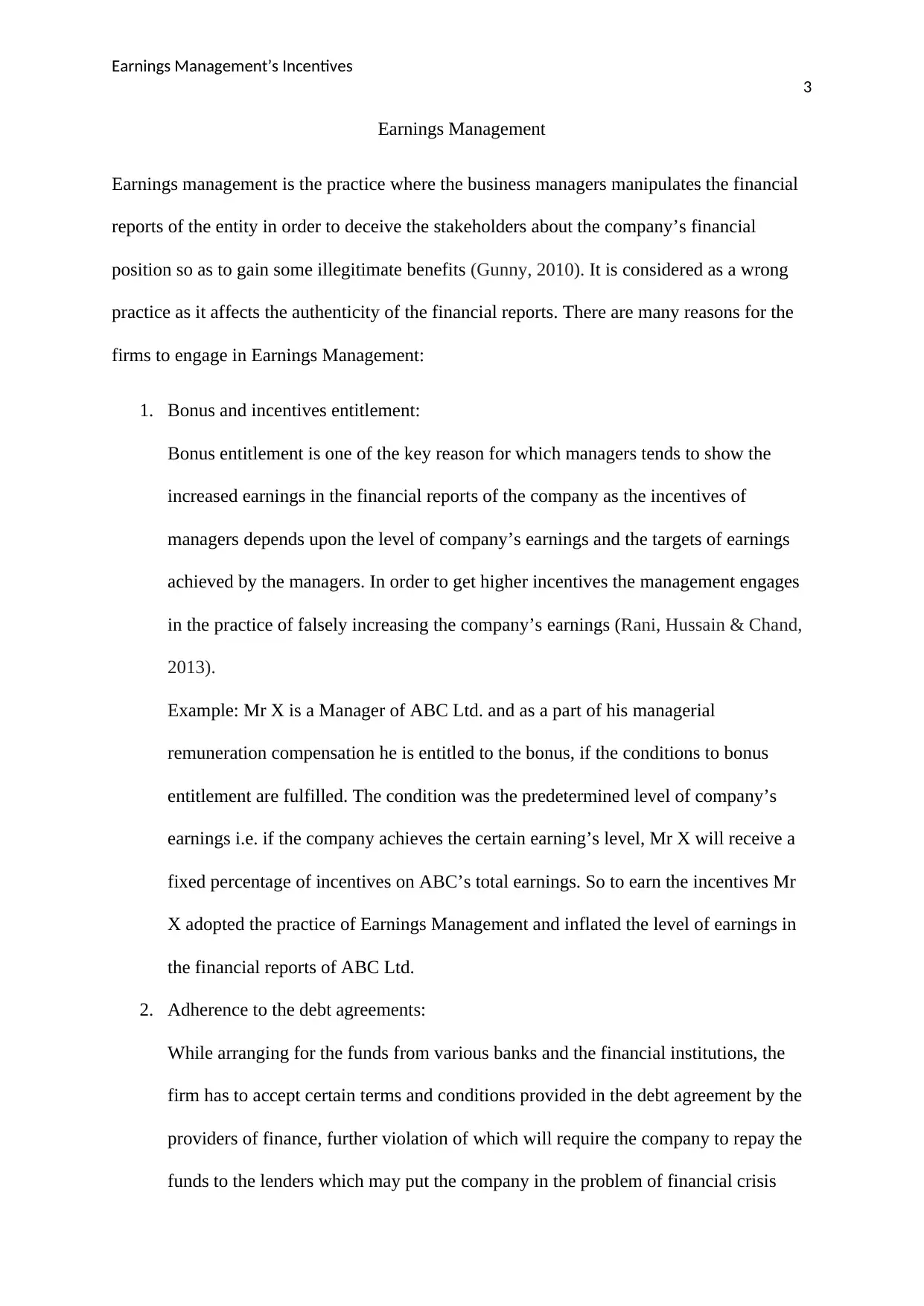
Earnings Management’s Incentives
3
Earnings Management
Earnings management is the practice where the business managers manipulates the financial
reports of the entity in order to deceive the stakeholders about the company’s financial
position so as to gain some illegitimate benefits (Gunny, 2010). It is considered as a wrong
practice as it affects the authenticity of the financial reports. There are many reasons for the
firms to engage in Earnings Management:
1. Bonus and incentives entitlement:
Bonus entitlement is one of the key reason for which managers tends to show the
increased earnings in the financial reports of the company as the incentives of
managers depends upon the level of company’s earnings and the targets of earnings
achieved by the managers. In order to get higher incentives the management engages
in the practice of falsely increasing the company’s earnings (Rani, Hussain & Chand,
2013).
Example: Mr X is a Manager of ABC Ltd. and as a part of his managerial
remuneration compensation he is entitled to the bonus, if the conditions to bonus
entitlement are fulfilled. The condition was the predetermined level of company’s
earnings i.e. if the company achieves the certain earning’s level, Mr X will receive a
fixed percentage of incentives on ABC’s total earnings. So to earn the incentives Mr
X adopted the practice of Earnings Management and inflated the level of earnings in
the financial reports of ABC Ltd.
2. Adherence to the debt agreements:
While arranging for the funds from various banks and the financial institutions, the
firm has to accept certain terms and conditions provided in the debt agreement by the
providers of finance, further violation of which will require the company to repay the
funds to the lenders which may put the company in the problem of financial crisis
3
Earnings Management
Earnings management is the practice where the business managers manipulates the financial
reports of the entity in order to deceive the stakeholders about the company’s financial
position so as to gain some illegitimate benefits (Gunny, 2010). It is considered as a wrong
practice as it affects the authenticity of the financial reports. There are many reasons for the
firms to engage in Earnings Management:
1. Bonus and incentives entitlement:
Bonus entitlement is one of the key reason for which managers tends to show the
increased earnings in the financial reports of the company as the incentives of
managers depends upon the level of company’s earnings and the targets of earnings
achieved by the managers. In order to get higher incentives the management engages
in the practice of falsely increasing the company’s earnings (Rani, Hussain & Chand,
2013).
Example: Mr X is a Manager of ABC Ltd. and as a part of his managerial
remuneration compensation he is entitled to the bonus, if the conditions to bonus
entitlement are fulfilled. The condition was the predetermined level of company’s
earnings i.e. if the company achieves the certain earning’s level, Mr X will receive a
fixed percentage of incentives on ABC’s total earnings. So to earn the incentives Mr
X adopted the practice of Earnings Management and inflated the level of earnings in
the financial reports of ABC Ltd.
2. Adherence to the debt agreements:
While arranging for the funds from various banks and the financial institutions, the
firm has to accept certain terms and conditions provided in the debt agreement by the
providers of finance, further violation of which will require the company to repay the
funds to the lenders which may put the company in the problem of financial crisis
Paraphrase This Document
Need a fresh take? Get an instant paraphrase of this document with our AI Paraphraser
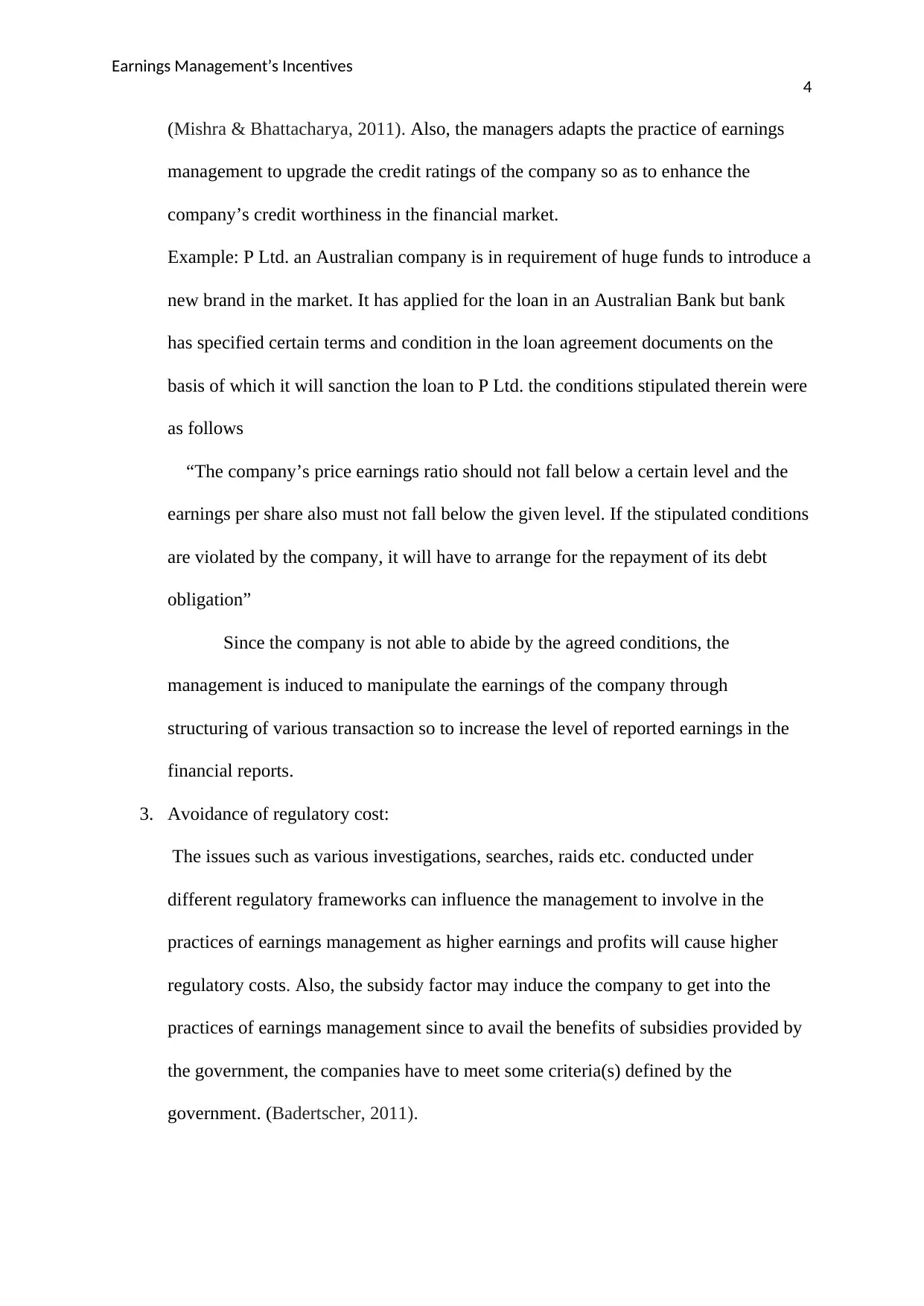
Earnings Management’s Incentives
4
(Mishra & Bhattacharya, 2011). Also, the managers adapts the practice of earnings
management to upgrade the credit ratings of the company so as to enhance the
company’s credit worthiness in the financial market.
Example: P Ltd. an Australian company is in requirement of huge funds to introduce a
new brand in the market. It has applied for the loan in an Australian Bank but bank
has specified certain terms and condition in the loan agreement documents on the
basis of which it will sanction the loan to P Ltd. the conditions stipulated therein were
as follows
“The company’s price earnings ratio should not fall below a certain level and the
earnings per share also must not fall below the given level. If the stipulated conditions
are violated by the company, it will have to arrange for the repayment of its debt
obligation”
Since the company is not able to abide by the agreed conditions, the
management is induced to manipulate the earnings of the company through
structuring of various transaction so to increase the level of reported earnings in the
financial reports.
3. Avoidance of regulatory cost:
The issues such as various investigations, searches, raids etc. conducted under
different regulatory frameworks can influence the management to involve in the
practices of earnings management as higher earnings and profits will cause higher
regulatory costs. Also, the subsidy factor may induce the company to get into the
practices of earnings management since to avail the benefits of subsidies provided by
the government, the companies have to meet some criteria(s) defined by the
government. (Badertscher, 2011).
4
(Mishra & Bhattacharya, 2011). Also, the managers adapts the practice of earnings
management to upgrade the credit ratings of the company so as to enhance the
company’s credit worthiness in the financial market.
Example: P Ltd. an Australian company is in requirement of huge funds to introduce a
new brand in the market. It has applied for the loan in an Australian Bank but bank
has specified certain terms and condition in the loan agreement documents on the
basis of which it will sanction the loan to P Ltd. the conditions stipulated therein were
as follows
“The company’s price earnings ratio should not fall below a certain level and the
earnings per share also must not fall below the given level. If the stipulated conditions
are violated by the company, it will have to arrange for the repayment of its debt
obligation”
Since the company is not able to abide by the agreed conditions, the
management is induced to manipulate the earnings of the company through
structuring of various transaction so to increase the level of reported earnings in the
financial reports.
3. Avoidance of regulatory cost:
The issues such as various investigations, searches, raids etc. conducted under
different regulatory frameworks can influence the management to involve in the
practices of earnings management as higher earnings and profits will cause higher
regulatory costs. Also, the subsidy factor may induce the company to get into the
practices of earnings management since to avail the benefits of subsidies provided by
the government, the companies have to meet some criteria(s) defined by the
government. (Badertscher, 2011).
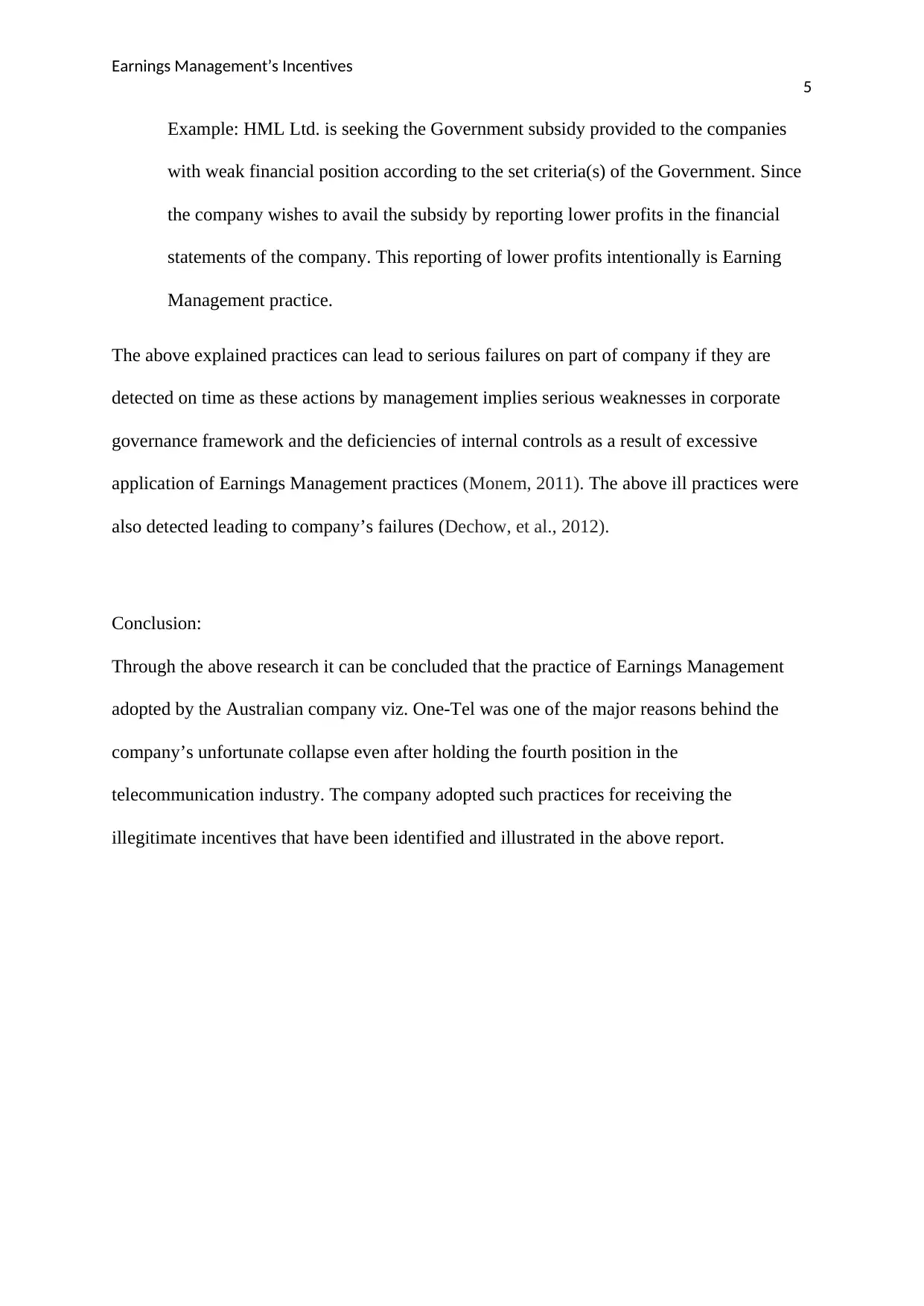
Earnings Management’s Incentives
5
Example: HML Ltd. is seeking the Government subsidy provided to the companies
with weak financial position according to the set criteria(s) of the Government. Since
the company wishes to avail the subsidy by reporting lower profits in the financial
statements of the company. This reporting of lower profits intentionally is Earning
Management practice.
The above explained practices can lead to serious failures on part of company if they are
detected on time as these actions by management implies serious weaknesses in corporate
governance framework and the deficiencies of internal controls as a result of excessive
application of Earnings Management practices (Monem, 2011). The above ill practices were
also detected leading to company’s failures (Dechow, et al., 2012).
Conclusion:
Through the above research it can be concluded that the practice of Earnings Management
adopted by the Australian company viz. One-Tel was one of the major reasons behind the
company’s unfortunate collapse even after holding the fourth position in the
telecommunication industry. The company adopted such practices for receiving the
illegitimate incentives that have been identified and illustrated in the above report.
5
Example: HML Ltd. is seeking the Government subsidy provided to the companies
with weak financial position according to the set criteria(s) of the Government. Since
the company wishes to avail the subsidy by reporting lower profits in the financial
statements of the company. This reporting of lower profits intentionally is Earning
Management practice.
The above explained practices can lead to serious failures on part of company if they are
detected on time as these actions by management implies serious weaknesses in corporate
governance framework and the deficiencies of internal controls as a result of excessive
application of Earnings Management practices (Monem, 2011). The above ill practices were
also detected leading to company’s failures (Dechow, et al., 2012).
Conclusion:
Through the above research it can be concluded that the practice of Earnings Management
adopted by the Australian company viz. One-Tel was one of the major reasons behind the
company’s unfortunate collapse even after holding the fourth position in the
telecommunication industry. The company adopted such practices for receiving the
illegitimate incentives that have been identified and illustrated in the above report.
⊘ This is a preview!⊘
Do you want full access?
Subscribe today to unlock all pages.

Trusted by 1+ million students worldwide
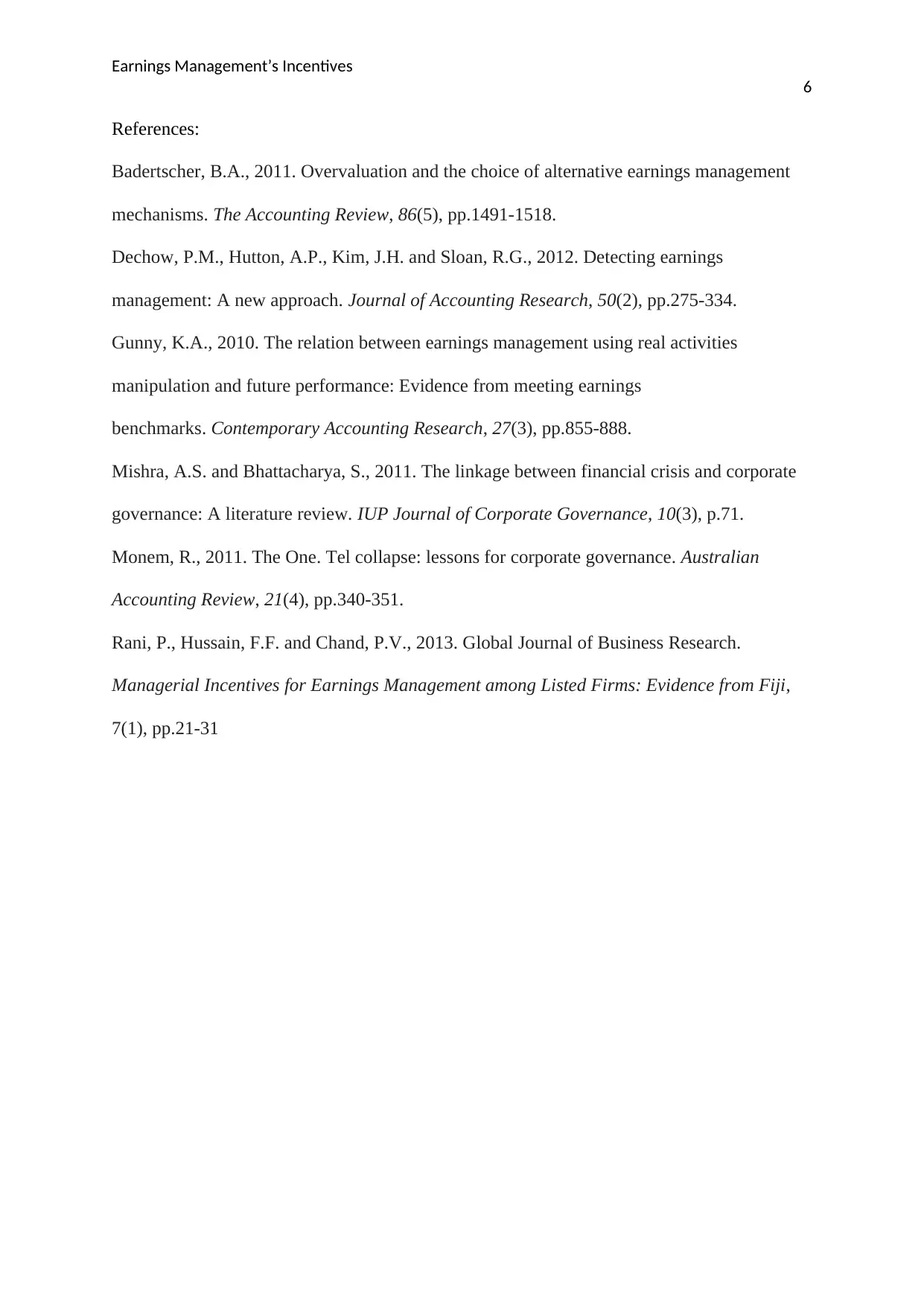
Earnings Management’s Incentives
6
References:
Badertscher, B.A., 2011. Overvaluation and the choice of alternative earnings management
mechanisms. The Accounting Review, 86(5), pp.1491-1518.
Dechow, P.M., Hutton, A.P., Kim, J.H. and Sloan, R.G., 2012. Detecting earnings
management: A new approach. Journal of Accounting Research, 50(2), pp.275-334.
Gunny, K.A., 2010. The relation between earnings management using real activities
manipulation and future performance: Evidence from meeting earnings
benchmarks. Contemporary Accounting Research, 27(3), pp.855-888.
Mishra, A.S. and Bhattacharya, S., 2011. The linkage between financial crisis and corporate
governance: A literature review. IUP Journal of Corporate Governance, 10(3), p.71.
Monem, R., 2011. The One. Tel collapse: lessons for corporate governance. Australian
Accounting Review, 21(4), pp.340-351.
Rani, P., Hussain, F.F. and Chand, P.V., 2013. Global Journal of Business Research.
Managerial Incentives for Earnings Management among Listed Firms: Evidence from Fiji,
7(1), pp.21-31
6
References:
Badertscher, B.A., 2011. Overvaluation and the choice of alternative earnings management
mechanisms. The Accounting Review, 86(5), pp.1491-1518.
Dechow, P.M., Hutton, A.P., Kim, J.H. and Sloan, R.G., 2012. Detecting earnings
management: A new approach. Journal of Accounting Research, 50(2), pp.275-334.
Gunny, K.A., 2010. The relation between earnings management using real activities
manipulation and future performance: Evidence from meeting earnings
benchmarks. Contemporary Accounting Research, 27(3), pp.855-888.
Mishra, A.S. and Bhattacharya, S., 2011. The linkage between financial crisis and corporate
governance: A literature review. IUP Journal of Corporate Governance, 10(3), p.71.
Monem, R., 2011. The One. Tel collapse: lessons for corporate governance. Australian
Accounting Review, 21(4), pp.340-351.
Rani, P., Hussain, F.F. and Chand, P.V., 2013. Global Journal of Business Research.
Managerial Incentives for Earnings Management among Listed Firms: Evidence from Fiji,
7(1), pp.21-31
1 out of 7
Related Documents
Your All-in-One AI-Powered Toolkit for Academic Success.
+13062052269
info@desklib.com
Available 24*7 on WhatsApp / Email
![[object Object]](/_next/static/media/star-bottom.7253800d.svg)
Unlock your academic potential
Copyright © 2020–2026 A2Z Services. All Rights Reserved. Developed and managed by ZUCOL.




